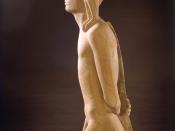After the flood Noah and his family repopulated the earth. Because the deluge did not eradicate sin, man's sinful nature ran wild once again. At the same time, territories were overrun with wild beasts, turning against the inhabitants of the land. The battle of man against beast was hot and fearful, but in the midst of it, Nimrod, son of Cush, appeared as the 'knight in shining armor'. A "mighty hunter," Nimrod delivered the people from the fear of beasts. Hungry for power, though, he also emancipated man from the LORD.
Until Nimrod, mankind was governed by the patriarchal system where the heads of families heard from God and guided their individual tribes. Nimrod, more accurately a "mighty hunter against the LORD," usurped patriarchal rule, and crowned himself the first human king in all of history. Now man ruled instead of God.
According to Jewish legend, Nimrod feared the prophecy that a child was to be born who would turn the people back to God.
In an effort to preserve his kingdom, he slew 70,000 babies in hopes of killing the would-be savior. The story goes that Abram of Ur was the prophetic baby, the father of Israel from whom the messiah would come.
Although Nimrod's motive was to keep the promised child from ruling, he used the fear of the wild beasts as a pretense for uniting the people, and established the kingdom of Babel. Presenting himself as savior, Nimrod convinced the inhabitants to look to him as the lord of the earth instead of the true God. Thus, the establishment of the kingdom was the beginning of the Babylon we read about in the Bible. Historically and symbolically, Babylon is any organized system that replaces God's rule with human or demonic rule.
Nimrod's greed and ambition led him...


